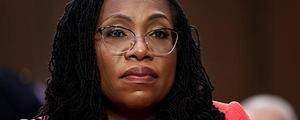GALLUP NEWS SERVICE
PRINCETON, NJ -- As President George W. Bush continues to mull over his choice of nominee for a new Supreme Court justice, a CNN/USA Today/Gallup poll finds most Americans would apparently welcome a female or Hispanic nominee, but few see either as an essential characteristic of the next justice. Earlier polling found a slight preference for a justice who would make the court more conservative, but Americans also clearly prefer a justice who would not overturn the Roe v. Wade decision on abortion rights.
Americans tend to believe the organized lobbying campaigns by liberal and conservative groups will do more harm than good to getting the best justice, but Democrats are more likely to believe such efforts will help. The public currently has the most negative view of the Supreme Court it has had since 2000.
The Next Justice
A July 7-10 CNN/USA Today/Gallup poll finds most Americans saying that a female or Hispanic justice would be a good idea, but few think choosing such a nominee is essential. Some have argued that Sandra Day O'Connor should be replaced by a female justice just as Thurgood Marshall was replaced by another black justice, Clarence Thomas, in 1991. Just 13% say it is essential that the next justice is a woman, but an additional 65% say it would be a good idea. An additional 18% say it doesn't matter to them, and 2% say it would be a bad idea.
Democrats and Republicans differ little in their assessments that choosing a woman would be a good idea, but Democrats are more likely to say it is essential to replace the retiring O'Connor with another woman.
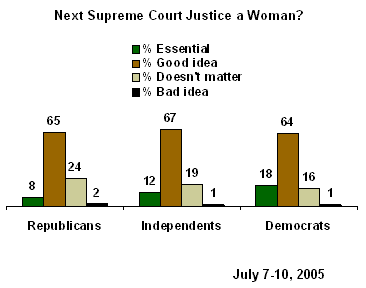
Bush has hinted that he would like to be the first president to nominate a Hispanic to the Supreme Court, and again most Americans say that would be a good idea (63%), but few believe it is essential (4%). Twenty-seven percent say it doesn't matter to them if the next justice is Hispanic, and 4% say it would be a bad idea.
A June 16-19 CNN/USA Today/Gallup poll asked Americans about the ideology of the next Supreme Court justice. The plurality of Americans, 41%, say they would like to see "Bush nominate someone who would make the Supreme Court more conservative than it currently is," while 30% want a justice who would make the court more liberal, and 24% want the composition of the court to be kept as it is now. O'Connor is generally believed to be a moderate conservative who often is the swing vote in determining whether the more liberal or more conservative justices prevail in court rulings. [The poll was conducted prior to the announcement of O'Connor's retirement, so it is unclear if that would have affected public opinion on this matter.]
As one might expect, conservatives overwhelmingly prefer a nominee who would move the court to the right and liberals overwhelmingly prefer a nominee who would move the court to the left. Moderates are more divided in their views. The overall preference for a conservative nominee is likely related to the fact that Americans are roughly twice as likely to identify as conservative as liberal.
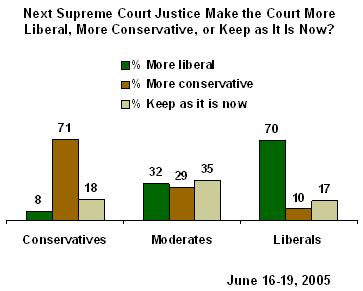
Despite the slight preference for a more conservative court, by a wide margin, Americans are not in favor of overturning the court's rulings on abortion rights, something that some see as possible if Bush replaces O'Connor with a strong pro-life justice. The July 7-10 poll shows 63% of Americans against overturning the Roe v. Wade decision that established a constitutional right to an abortion, while 28% are in favor.
Americans' views on overturning Roe are strongly related to their ideological identification -- liberals are overwhelmingly against overturning the decision (84% to 9%), while conservatives are evenly divided in their views, as 45% would like to see the decision reversed and 45% would not. Moderates come down strongly on the side of keeping Roe as the law, with only 17% in favor of overturning it and 77% opposed.
Political Context
Earlier polling showed nearly half of Americans, 48%, saying the choice of the next Supreme Court justice mattered a great deal to them. An additional 26% say it mattered a "moderate amount," so clearly most have something invested in the decision of who the next justice is.
Additionally, public approval of the court is the lowest Gallup has measured since it began tracking Supreme Court job approval in 2000. A June 24-26 CNN/USA Today/Gallup poll found 42% approving of the court, after approval had been above 50% in all prior measurements. The poll was conducted immediately after the court announced its controversial decision on eminent domain, but before it announced its split decisions on the displays of Ten Commandments monuments on government property (prior Gallup polling showed three in four Americans saying the court should allow state governments to do so).
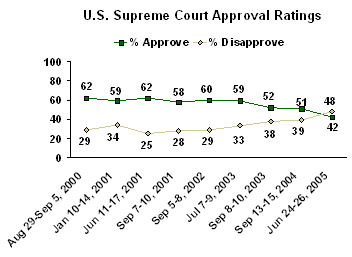
With that background, it may not be surprising that extensive organized lobbying efforts from both sides of the ideological spectrum are beginning over the choice of the next justice. These groups are using, or plan to use, campaign-style techniques such as television ads, direct mail, and traditional lobbying to pressure Bush and senators to put a justice in place that is most acceptable to them.
The public tends to think these efforts will do more harm than good. A majority of Americans, 54%, believe such campaigns will be "harmful to getting the best person on the court," while 39% say they will be helpful.
There are partisan differences on this count. By a 49% to 43% margin, Democrats say such campaigns will be helpful. In contrast, Republicans say they will be harmful by a 63% to 32% margin. Independents are more likely to believe they will be harmful. Democrats' belief that such efforts will aid the process may be based on the notion that heavy political pressure on Bush might force him to choose a moderate, rather than a conservative, justice.
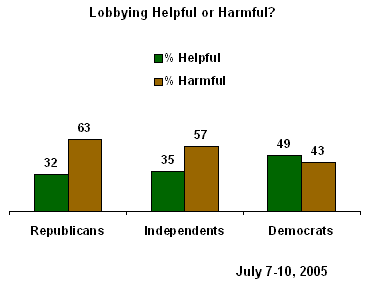
Survey Methods
These results are based on telephone interviews with a randomly selected national sample of 1,006 adults, aged 18 and older, conducted July 7-10, 2005. For results based on this sample, one can say with 95% confidence that the maximum error attributable to sampling and other random effects is ±3 percentage points. In addition to sampling error, question wording and practical difficulties in conducting surveys can introduce error or bias into the findings of public opinion polls.
Next, as you may know, Supreme Court Justice Sandra Day O'Connor announced that she would retire from the court.
Q.52-53 ROTATED
52. Which of the following best describes your view about the next Supreme Court justice - [ROTATED: you think it is essential that the next justice is a woman, you think having a woman as the next justice would be a good idea, but is not essential, it doesn't matter to you if the next justice is a woman or not, (or) you think having a woman as the next justice would be a bad idea]?
|
|
Good idea, |
Doesn't |
Bad |
No |
|
|
|
|
|
|
|
|
|
2005 Jul 7-10 |
13% |
65 |
18 |
2 |
1 |
53. Which of the following best describes your view about the next Supreme Court justice - [ROTATED: you think it is essential that the next justice is a Hispanic, you think having a Hispanic as the next justice would be a good idea, but is not essential, it doesn't matter to you if the next justice is a Hispanic or not, (or) you think having a Hispanic as the next justice would be a bad idea]?
|
|
Good idea, |
Doesn't |
Bad |
No |
|
|
|
|
|
|
|
|
|
2005 Jul 7-10 |
4% |
63 |
27 |
4 |
2 |
54. As you may know, conservative and liberal groups have begun campaigns to influence the choice of who is picked to serve on the Supreme Court. These campaigns include advertisements and lobbying of senators. Do you feel these campaigns will be helpful or harmful to getting the best person on the court?
|
Helpful |
Harmful |
No opinion |
|
|
|
|
|
|
|
2005 Jul 7-10 |
39% |
54 |
7 |
Q.60-61 SPLIT SAMPLED
60. The 1973 Roe v. Wade decision established a woman's constitutional right to an abortion, at least in the first three months of pregnancy. Would you like to see the Supreme Court COMPLETELY OVERTURN its Roe v. Wade decision, or not?
BASED ON 489 NATIONAL ADULTS IN FORM A
|
|
Yes, |
No, |
No |
|
% |
% |
% |
|
|
2005 Jul 7-10 ^ |
29 |
68 |
3 |
|
|
|
|
|
|
2002 Mar 22-24 |
36 |
60 |
4 |
|
1992 Aug 13-14 |
34 |
60 |
6 |
|
1989 Oct 5-8 |
33 |
61 |
6 |
|
1989 Jul 6-7 |
31 |
58 |
11 |
|
|
|
|
|
|
^Asked of a half sample |
|||
61. Would you like to see the Supreme Court overturn its 1973 Roe v. Wade decision concerning abortion, or not?
BASED ON 517 NATIONAL ADULTS IN FORM B
|
|
Yes, |
No, |
No |
|
|
|
|
|
|
2005 Jul 7-10 ^ |
28% |
63 |
9 |
|
|
|
|
|
|
^Asked of a half sample |
|||
